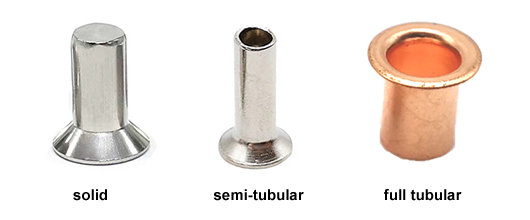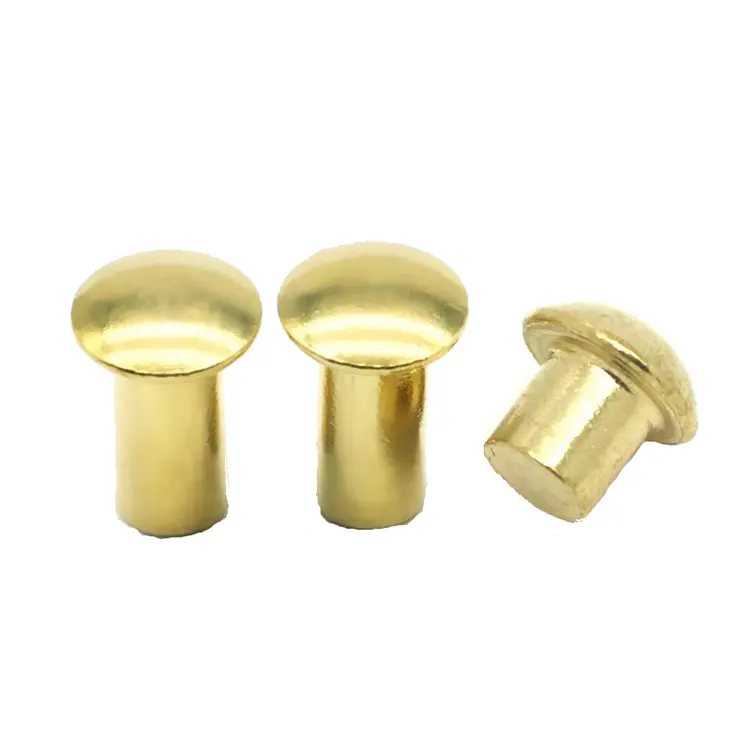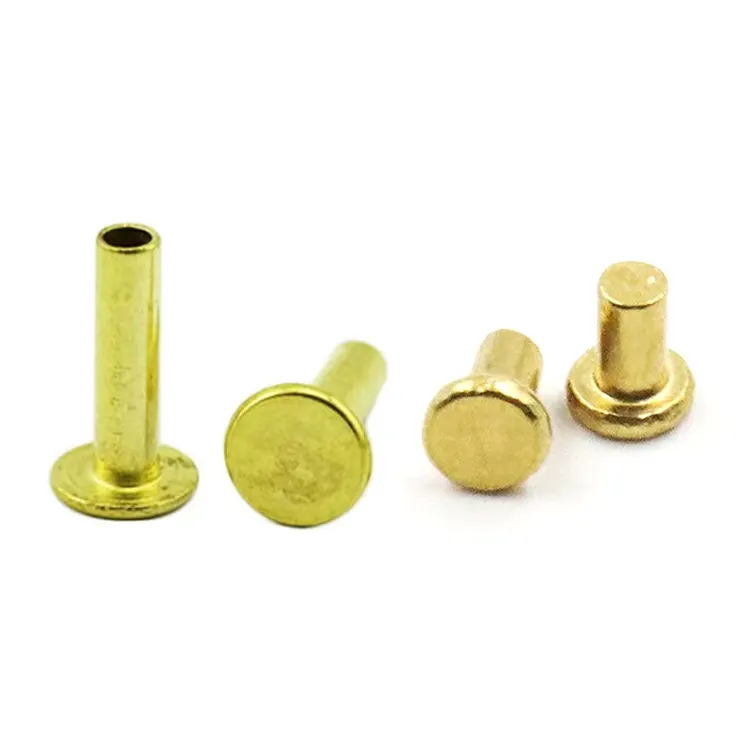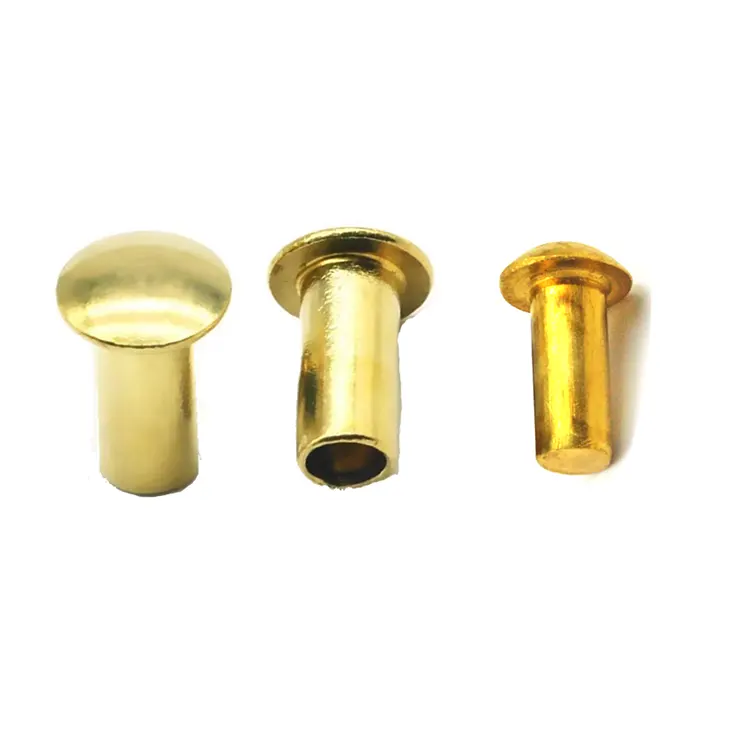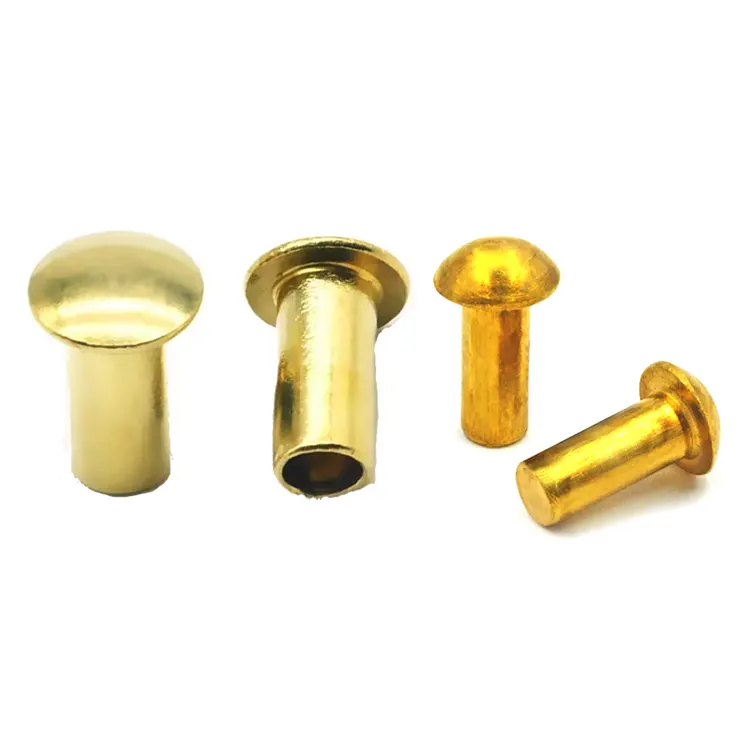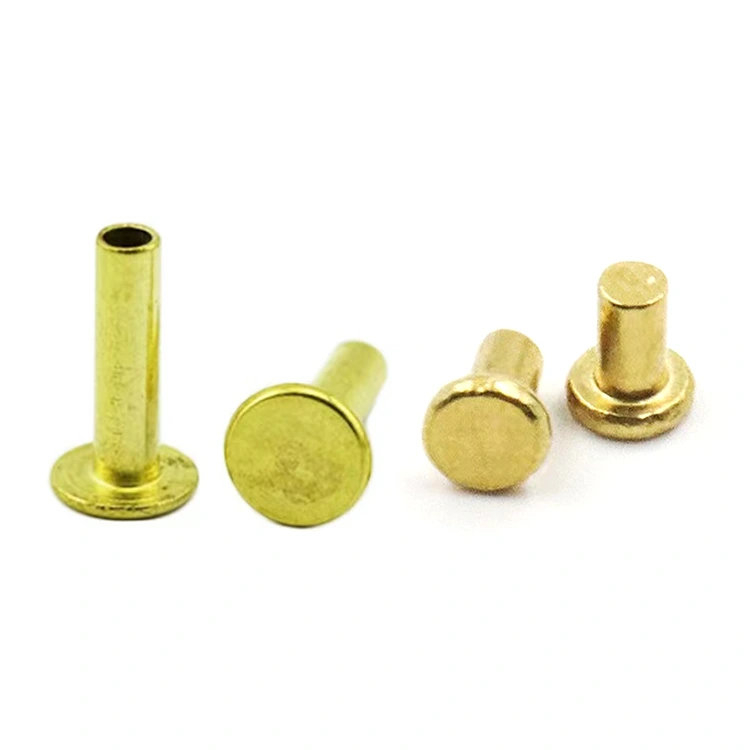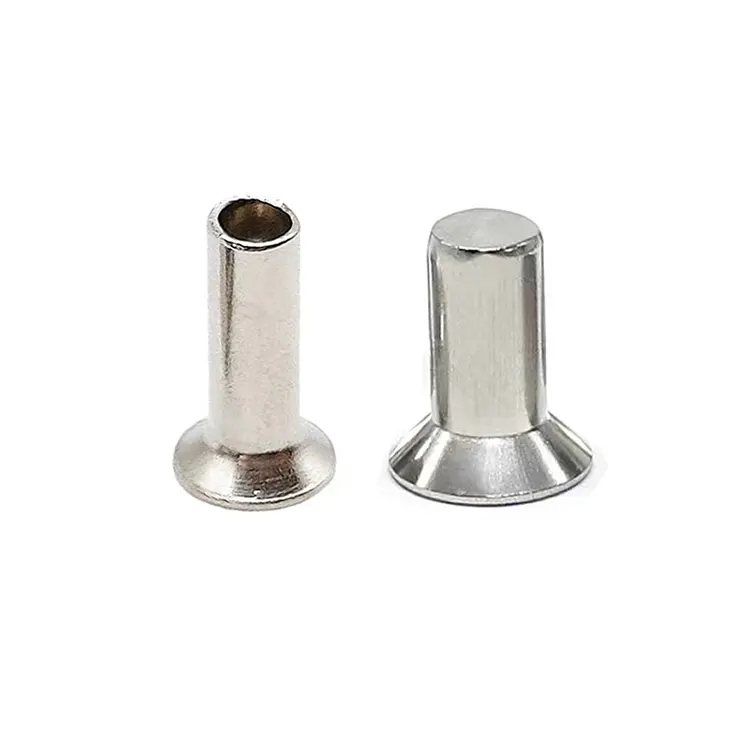Rivet
As one of professional manufacturer in China, Notin would like to provide you Rivets. And we will offer you the best after-sale service and timely delivery.
What is a rivet?
A rivet is a permanent mechanical fastener used to join two or more materials. Rivets work by inserting a metal pin into an aligned hole and deforming the end, creating a strong, secure, and durable connection. Unlike temporary fasteners like screws, rivets do not rely on threads, but instead form a permanent connection, making them ideal for applications requiring high strength, durability, and vibration resistance.
Classification of Rivets
Rivets are typically categorized by head shape, degree of hollowness, or material.
Based on head shape, rivets can be classified as flat head rivets, round head rivets, countersunk head rivets, mushroom head rivets, universal head rivets, truss head rivets, etc.

Based on degree of hollowness, rivets can be classified as solid rivets, semi-tubular rivets, or full tubular rivets.
Based on material, rivets can be classified as brass rivets, stainless steel rivets, steel rivets, aluminum rivets, copper rivets, etc.

What surface finishes are available for rivets?
Rivet surfaces are typically treated with rust-proofing treatments, primarily electroplating, including zinc plating, nickel plating, chrome plating, tin plating, gold plating, and silver plating. Electroplating is a common rust-proofing method for rivets. It applies a layer of plating to the rivet surface through physical or chemical methods. The plating effectively prevents corrosion and rust, while also providing a certain aesthetic effect.
Another special surface treatment method is head coating. Head coating is performed after the rivet is electroplated. This allows for a variety of colors on the rivet head, achieving an aesthetically pleasing finish.
Aluminum rivets cannot be electroplated, but they can be anodized. Anodizing also allows for a variety of color options, but the unit price is higher than electroplating.
Rust-proofing the rivet surface is crucial, effectively extending the rivet's service life and ensuring a secure connection. Different rust-proofing methods are suitable for different environments and applications, so the choice should be tailored to the specific situation.
- View as
Rivet kepala pusingan tembaga
Logam Nuote mengkhususkan diri dalam pengeluaran dan penjualan rivet kepala pusingan tembaga. Kami terletak di Dongguan, China, sebuah bandar yang mempunyai pembangunan perindustrian yang kuat. Rivet kepala separa tembaga kami terdiri daripada batang dan topi yang diperbuat daripada aloi tembaga. Reka bentuk kepala separuh bulgy memberikan pengedaran tekanan seragam, mencegah kerosakan pada permukaan bersama. Mereka dicirikan oleh kekonduksian elektrik gabungan dan rintangan kakisan, pembinaan mudah, pemasangan mudah, kebolehpercayaan yang tinggi, dan hayat perkhidmatan yang panjang.
Baca LagiHantar PertanyaanRivet tembaga
Logam Nuote menghasilkan rivet tembaga di China, rivet tembaga terutamanya diperbuat daripada aloi tembaga dan zink, bahan yang menawarkan pelbagai kelebihan. Rintangan kakisan yang sangat baik Brass membolehkan ia menahan penggunaan jangka panjang dalam persekitaran lembap tanpa berkarat, menjadikannya sesuai untuk kegunaan luar atau dalam keadaan kelembapan yang tinggi. Tembaga juga mempunyai kekuatan dan kekerasan, membolehkannya menahan tekanan mekanikal sambil mengekalkan ketangguhan yang baik dan menentang kerosakan. Tembaga juga mempunyai kekonduksian elektrik dan terma yang sangat baik, menjadikannya sesuai untuk digunakan dalam peralatan elektronik dan terma. Permukaan lancar tembaga membolehkan pengesan atau penggilap mudah, meningkatkan estetikanya. Ciri -ciri ini menjadikan tembaga rivet pilihan pilihan di banyak industri.
Baca LagiHantar PertanyaanRivet Kepala Kuali Loyang
Nuote Metals pakar dalam pengeluaran rivet kepala kuali loyang. Rivet kami diperbuat daripada loyang H65, yang mempunyai kandungan loyang yang tinggi, lembut dan mudah dibentuk, dan kurang berkemungkinan retak semasa proses memukau. Rivet kepala kuali tembaga terdiri daripada kepala dan batang, dengan batang berongga kira-kira separuh panjangnya. Semasa pemasangan, rivet dimasukkan ke dalam lubang pra-gerudi. Menggunakan mesin rivet dan penebuk khusus, hujung shank mengembang dan membentuk kepala di sisi lain, mewujudkan sambungan pengapit. Proses ini bergantung pada ubah bentuk plastik logam, menghapuskan keperluan untuk kimpalan atau pelekat, menjadikannya mudah dan cekap.
Baca LagiHantar PertanyaanRivet kepala cendawan tembaga
Rivet kepala cendawan tembaga terdiri daripada kepala dan badan. Kepala bulat dan sedikit meratakan, menyerupai topi cendawan. Tubuh itu separuh berongga, bermakna ia mempunyai lubang di tengah tetapi tidak pergi sepenuhnya. Ini dipanggil rivet kepala cendawan separuh kosong tembaga. Sesetengah rivet mempunyai badan yang padat, yang dipanggil rivet kepala cendawan pepejal tembaga. Semasa pemasangan, alat khusus digunakan untuk memasukkan badan ke dalam lubang pra-digerakkan. Tekanan digunakan untuk mengubah bentuk badan, menyebabkan ia mengembangkan dan menggenggam bahan, mewujudkan sambungan yang selamat. Logam Nuote mengkhususkan diri dalam menghasilkan rivet kepala cendawan tembaga ini.
Baca LagiHantar PertanyaanRivet kepala rata tembaga
Rivet kepala rata tembaga adalah batang logam dengan topi pada satu hujung. Mereka mencapai riveting melalui ubah bentuk atau gangguan gangguan dan pengikat biasa. Reka bentuk kepala rata mengurangkan protrusion permukaan, menjadikannya sesuai untuk aplikasi yang memerlukan kebosanan yang tinggi. Rintangan kakisan tembaga memastikan kestabilan sambungan walaupun dalam persekitaran yang lembap dan menghakis. Logam Nuote mengkhususkan diri dalam pengeluaran rivet kepala rata tembaga. Kami mempunyai beribu -ribu acuan dan boleh menghasilkan pelbagai spesifikasi rivet. Kami juga menyokong reka bentuk dan sampel tersuai.
Baca LagiHantar PertanyaanRivet kepala countersunk tembaga
Rivet kepala countersunk tembaga terutamanya terdiri daripada kepala dan batang. Ketua Countersunk membolehkan pemasangan siram dengan permukaan bahan kerja, menghapuskan protrusions yang boleh mempengaruhi penampilan atau fungsi. Reforms shank separa berongga semasa proses memukau, mencapai sambungan. Reka bentuk ini bukan sahaja meningkatkan kecekapan pemasangan tetapi juga meningkatkan kebolehpercayaan sambungan. Logam Nuote mengkhususkan diri dalam pembuatan rivet kepala countersunk tembaga, yang mempunyai ketepatan yang tinggi dan permukaan yang licin dan bebas. Kami mengalu -alukan rakan -rakan dari seluruh dunia untuk melawat syarikat kami dan bekerjasama dengan kami.
Baca LagiHantar PertanyaanWhat are the advantages of rivets over other fasteners?
1. Ease of Installation
Rivets are fast to install, and even fully automated for high-volume applications, resulting in a simple and efficient operation process.
2. Connection Reliability
The riveting process is standardized, with strict quality control, resulting in highly stable connections. Visual inspection allows for quick verification of connection quality.
3. Vibration and Impact Resistance
Rivets connect through deformation or interference fit, providing strong clamping force and excellent vibration resistance, capable of withstanding vibration and shock.
4. Low Cost
Rivets are easy to install and can be fully automated, saving significant labor costs.
What are the advantages and disadvantages of rivets made of different materials?
Aluminum Rivets
Advantages: Lightweight, reduces overall product weight, low cost, suitable for general civilian applications.
Disadvantages: Low tensile and shear strength, unsuitable for high-strength workpieces, prone to electrochemical corrosion when in contact with metals such as stainless steel.
Stainless Steel Rivets
Advantages: Strong corrosion resistance, high hardness, suitable for high-strength workpieces (such as marine equipment)
Disadvantages: Higher cost, typically more expensive than aluminum rivets of the same specification.
Brass and Copper Rivets
Advantages: Excellent conductivity (such as connecting electronic components), good corrosion resistance.
Disadvantages: Higher cost, more difficult to process.
Steel Rivets
Advantages: High hardness, high connection reliability, and wide applicability.
Disadvantages: Compared to other materials, iron rivets are more prone to rusting.
What are the main applications of rivets?
Rivets have a wide range of uses, from small items like a pair of scissors to large items like airplanes and ships, as well as in high-precision medical applications.
Industrial Manufacturing
Rivets are used in a wide variety of industrial fields, wherever there is a need to connect two or more materials.
Electronics
Rivets secure heat sinks and chips, providing both vibration damping and noise reduction, and are widely used in the cooling systems of electronic products such as computers and mobile phones.
Automotive
Rivets are widely used to connect components of automobile bodies and chassis, such as doors and hoods. Their lightweight and corrosion-resistant properties make them an indispensable joining method in automotive manufacturing.
Aerospace
In aircraft manufacturing, rivets are used to connect different fuselage components, such as wings and tailplanes. Millions of rivets create high-strength, corrosion-resistant joints. Aluminum and titanium alloy rivets are often used to connect components of corresponding materials, ensuring stability in extreme environments.
Rivets are used everywhere. The above examples only represent a small number of their applications. We see rivets everywhere in our daily lives, such as on scissors, folding beds, and strollers etc. Rivets can be customized to different sizes and materials depending on the application.
Nuote Metals has specialized in the rivet industry for over a decade. Our factory is located in Dongguan, a city known as the "World Factory," a city with a developed industry and convenient transportation. This allows us to respond quickly when acquiring raw materials and supporting surface treatments, meeting our customers' needs for quick access to samples and bulk orders. We produce 10 million rivets daily and have molds of various specifications, allowing us to produce rivets as small as 0.8mm and as large as 10mm. We welcome your inquiries and visits.






